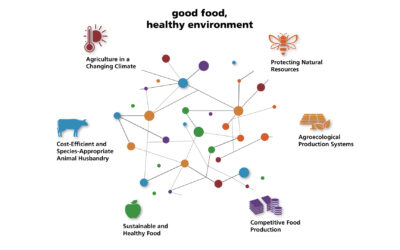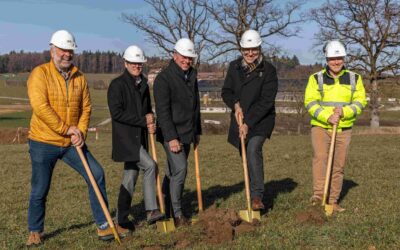Impact Digest | Controlled Environment Agriculture: How is technology shaping the future of farming?

As the global population is predicted to approach 10 billion by 2050, the demand for sustainable, efficient food production systems has become a critical challenge.
Controlled environment agriculture (CEA) – an advanced farming method that optimises plant growth by regulating conditions in enclosed systems – is one way innovators are tackling this issue.
At our Impact Forum: Controlled Environment Agriculture on 11 March 2025, we invited three expert speakers to discuss the current situation in conversation with Valley CEO Christina Senn-Jakobsen. Here’s what we learned…
Key Takeaways
- Future food security: Resource-efficient agricultural systems are designed to produce food year-round in controlled conditions and could be a key part of the solution to feeding a world growing faster than the crops needed to sustain it.
- Environmental benefits: The benefits of CEA systems include reduced water use and nitrogen emissions, higher yields, and limited use of pesticides.
- Technological innovations: Advances in hydroponics, aeroponics, and vertical farming are accelerating growth in the sector, with AI, the IoT and automation optimising production efficiency.
- Challenges in scaling and implementation: High initial costs and energy consumption are major barriers to scaling CEA – integrating renewables into tech-enabled farming systems will be crucial.
- The importance of public perceptions: The future of indoor farming also depends on how well the industry communicates its value to the public and combats any misinformation about the technology and its safety.
- Industry collaboration: Cross-sector partnerships can drive innovation, but there is a need for greater policy support and funding to achieve this.
- Our three expert speakers shared a vision for CEA’s role in global food security and sustainability, and the role of Switzerland in testing out solutions on a smaller scale initially
Switzerland: a living lab for food system innovation
Insights from Dr Fabian Wahl, Executive Board Member at Agroscope
Fabian from Agroscope explained his research on cultivating single-cell microalgae as an energy-efficient and sustainable protein alternative. He noted that while traditional food systems rely on animal- and plant-based products, microorganisms – specifically bacteria – represent the largest and most diverse biomass on Earth, yet are largely untapped for food production.
As microalgae can be cultivated with minimal environmental impact, they offer a genuinely superior alternative to conventional agriculture. They can be grown on rooftops or in industrial /agricultural spaces, require no arable land, no synthetic pesticides and significantly less water.
From a regulatory perspective, Fabian noted that only four species of microalgae are currently approved for human consumption, though more species are under review. He also acknowledged the slow approvals process is limiting the industry’s ability to fully exploit the potential of microalgae.
Fabian sees Switzerland as a “living lab” for food system innovation, suggesting that the country could develop and refine CEA technologies before scaling them globally to meet the needs of a growing population.
Indoor farming: A complementary solution for urban food production
Insights from Bruno Cheval, CEO of CleanGreens Solutions
Bruno highlighted the challenges faced by traditional agriculture, including unpredictable weather patterns, lack of resources and labour, and disruptions from global events like COVID-19 and war. In light of this, Bruno explained the benefits of indoor farming: less reliance on external climate conditions, optimised resources and automating some of the labour involved. He also touched upon the importance of data-driven farming and how AI and IoT can help optimize lighting, temperature, and resource use.
CleanGreens uses an innovative aeroponics system, where plant roots are suspended in the air and irrigated by a robot, resulting in higher yields compared to traditional farming and other hydroponics. The system has already seen success in France and Kuwait, with plans to expand further into the Middle East, North America and beyond.
Bruno also acknowledged the high energy consumption and costs associated with CEA. He stressed that scalability will depend on innovations in energy efficiency, such as integrating renewable energy into CEA systems. He emphasised the need for continued investment and collaboration, and argued that CEA should not be seen as a replacement for traditional farming, but rather a complementary solution for urban food production.
Crafting a new narrative: consumer perceptions of CEA
Insights from Martino Corti, Head of Innovation at UMAMI
Martino emphasised that while many discussions focus on the technical aspects of CEA, it is also important to understand how customers perceive indoor farming and whether they will accept new methods of food production.
Martino pointed out that public awareness and trust in CEA are still evolving. Many consumers value sustainability and local food production, but may harbour misconceptions about indoor-grown produce or lack knowledge about its safety. He stressed that educating consumers on the benefits of sustainable farming will be essential to drive adoption.
From a technical perspective, he shared how UMAMI’s aquaponics-based indoor farming system integrates fish, shrimp, and other aquatic organisms to create a closed-loop ecosystem. This system naturally fertilizes plants without synthetic fertilizers, significantly reducing waste and water usage.
Martino concluded by reinforcing that while technology is key, market acceptance, storytelling, and branding will play a major role in the success of CEA in the food industry. The future of indoor farming will depend not only on technical improvements but also on how well the industry communicates its value to the public.
Latest News
Agroscope’s new work programme places a greater focus on impact and practical benefits
Agroscope’s 2026-2029 Work Programme...
Nestlé announces two global collaborations to help scale regenerative agriculture
To accelerate the transition to...
New production facility will support the evolution of fermentation-based food systems in Switzerland
The construction of the new building...
OneAgrix appoints Philippe Chatelain to Board of Advisors
OneAgrix, a Swiss–Singapore...



